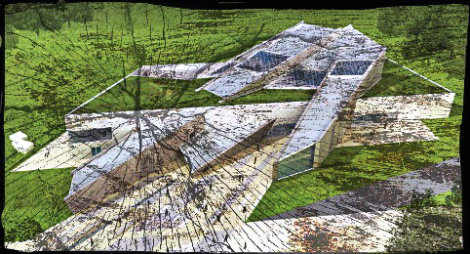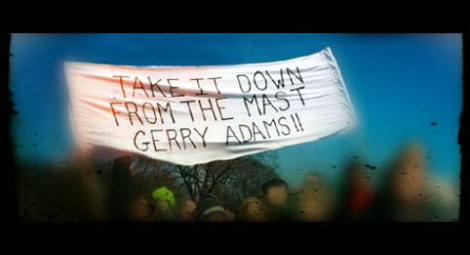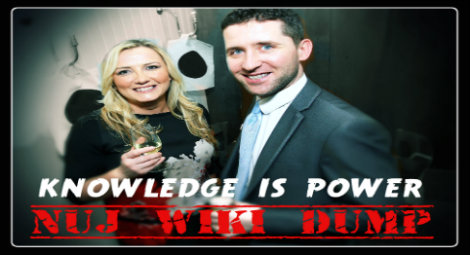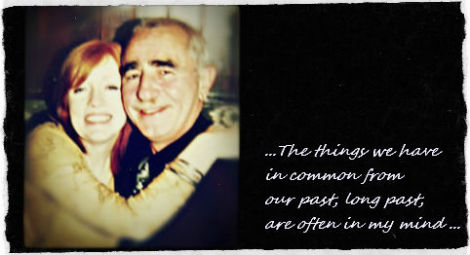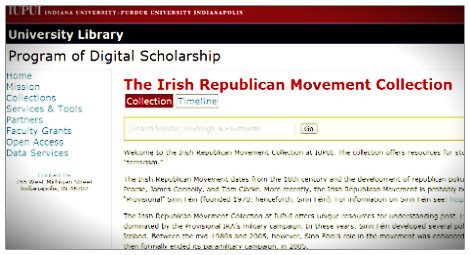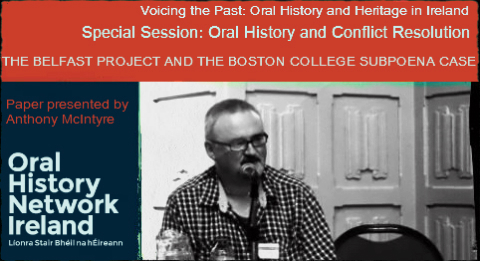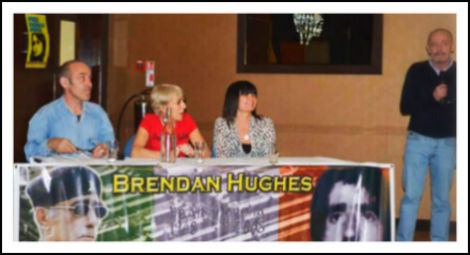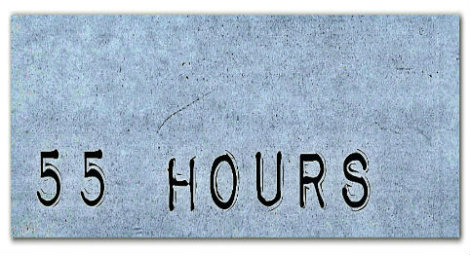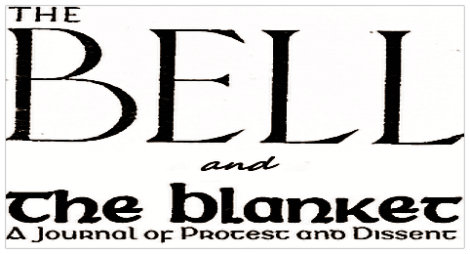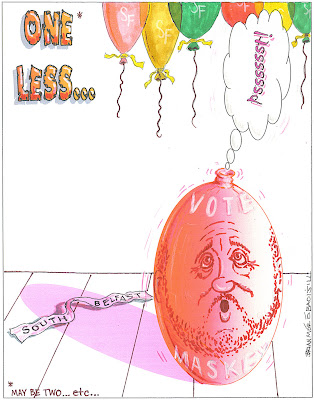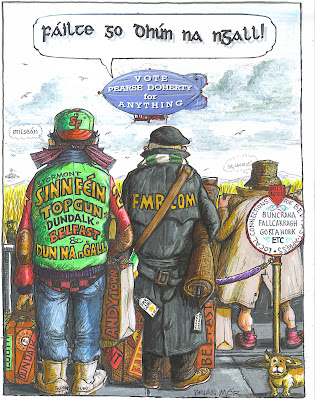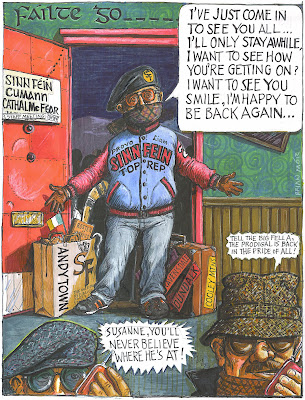Wiki-Dump
All correspondence in relation to Allison Morris' and Ciaran Barnes' complaints and the NUJ's handling of the issue.
Dolours Price Archive
"I look forward to the freedom to lay bare my experiences unfettered by codes now redundant."
Irish Republican Movement Collection
Annoucing the Irish Republican Movement Collection online archive at IUPUI
The Belfast Project and Boston College
The Belfast Project and the Boston College Subpoena Case: The following paper was given at the Oral History Network of Ireland (OHNI) Second Annual Conference in Ennis, Co Clare on Saturday the 29th September 2012
Challenge and Change
Former hunger striker Gerard Hodgkins delivered the 2013 annual Brendan Hughes Memorial Lecture
Brendan Hughes: A Life in Themes
There is little to be gained in going from an A to Z chronological tour of the life of Brendan Hughes. The knowledge is out there. Instead a number of themes will covey to those who are interested what was the essence of the man.
55 HOURS
Day-by-day account of events of the 1981 Hunger Strike. A series in four parts:
July 5 ● July 6 ● July 7 ● July 8
The Bell and the Blanket
Journals of Irish Republican Dissent: A study of the Bell and Blanket magazines by writers Niall Carson and Paddy Hoey
Monday, May 31, 2010
Sunday, May 30, 2010
Great
It is about 18 months since I read Great Hatred Little Room. Getting around to writing about what I read was subject to a review delay mechanism – little free time. Like so many other books that made it into the holiday flight bag, their post-read hibernation detained them unduly long before permitting them to venture out again.
I am never quite sure that it is good for the health to be whisked away from Ireland to sunny pool strewn climes only to allow the tentacle of a book about the county’s conflict to wrap itself around the mind and leech the attention from poolside to political ringside. That said, there are much worse booky-traps to step upon than this one by the former British Prime Minister Tony Blair’s chief of staff, Jonathan Powell. In its pages he explains that his main aim in writing the memoir was to explain why the Blair government did what it did.
When published, Great Hatred Little Room made quite a splash. The memoirs of a political insider always stir curiosity even if they fail to satisfy it. The disparity between promise and delivery is particularly true in the case of insiders who do not want to face the cold elements of life on the outside. As Tony Blair’s key mandarin on the North, Powell was much better positioned to access vital strategic intelligence than the opening pages of his political memoir would suggest. There Powell floats the notion that the Blair strategic network had no inkling of how the process of engagement with republicans that it had embarked upon might end.
It is hard to see how this can even begin to feign accuracy. The reader is invited to believe that the British lacked strategic prescience. There were many others, without the means to access the information available to those involved in the Blair Project, who were quite able to foresee the outcome. It was hardly rocket science. It is not sustainable to believe that so much premium prime ministerial time was devoted to the Northern conflict without the certainty of a handsome dividend for the investors. Blair was not about to be interred in the Northern Irish political graveyard. He came to bury not to be sucked into the ground himself.
Blair, like Prime Ministers before him, did not operate in an information vacuum. He made judgements shaped by what was conveyed to him by among others Sinn Fein.
In fact, as back as 1986 the British state was made aware of the likely direction in which the then – and still – Sinn Fein president Gerry Adams wished to steer the republican project. He had conveyed his strategic intentions to both it and later the Irish government. The idea of an unarmed struggle had already been floated towards the end of 1982. By 1986 there was some additional evidence beginning to emerge that not every member of the seven man army council favoured a continuation of the war. The task of the British state once it had this knowledge, was to facilitate the Sinn Fein leadership in beaching the republican project, albeit hesitatingly managed by the British in fits and starts.
The exercise was once described to the journalist Ed Moloney by someone on the British side as ‘turning the Titanic in a bathtub.’ Observers may not have felt that this particular Titanic would end up as badly holed as it eventually was but it was always a matter of degree rather than kind. The British intention was to ensure it would never sail again. The purpose of the Blair Ditch Project was to let republicans into the constitutional political arena but to ensure that republicanism never crossed the threshold. No matter how much republican leaders might prosper in terms of their political careers the republicanism which they had utilised as the booster rocket was to be rendered barren as a political entity.
The strategic theatre was set: the Provisionals were to be encouraged into constitutional politics while facing no limits on their political growth in the North. So long as every concession ceded by the British was ring fenced in by the consent principle – always the commanding height never to be ceded to Irish republicanism by the British – nothing else mattered. Endless reconfigurations of the internal sinews of an equally internal solution would be put up with. That strategic objective was an unqualified success for Blair.
Powell points out just how well the British Prime Minister understood the strategic significance of having the Provisionals sign up to the consent principle, long described by them as the ‘unionist veto.’ Enshrining the veto as the measure of the unit of national self determination was the crucial strategic objective:
Tony had zeroed in on the fundamental principle: what was the unit that had the right to national self-determination? …It had to be the people of Northern Ireland who should have the say. For the unionists this was of fundamental importance.
Since 1970 the one consistent strategic objective of the British state was to secure the defeat of the IRA. The type of political arrangement most likely to secure and sustain that defeat was secondary to it being put in place. The British had neither the will nor the ability to overcome the existence of partition. The political parameters it laid down were regarded as a fait accompli within which the British state would have to operate. But in relation to the political arrangements governing the North once the partition/consent principle was enshrined and acquiesced in by republicans, the British genuinely were neutral. Whatever worked and kept the place quiet was all that was required. It did not have to be just or fair, merely workable. Get the Provisionals to work rather than wreck Northern Ireland was the prize.
When Powell said that consent would be the most difficult concession for republicans to make he was simultaneously saying it was the most important republican position for the British state to seize: ‘If they accepted the principle of consent … what had the armed campaign and the suffering been for?’
Hardly the first one to have asked that question Jonathan.
Jonathan Powell, 2008. Great Hatred Little Room. The Bodley Head: London
Book Review in four parts:
1. Great
2. Hatred
3. Little
4. Room
Saturday, May 29, 2010
Concerned Families and Friends of the Maghaberry Prisoners Public Meeting
A panel to include human rights activists and legal experts outlined the conditions the men in Maghaberry are being forced to endure and a question and answer session followed for development of debate.
Chairing the proceedings was Maura McCrory, a veteran of the anti-H-Block/Armagh campaign who took to the streets in defence of prisoners rights with The Relatives Action Committee, in 1976.
Former hunger striker Gerard Hodgins and Maureen Fitzsimons, sister of prisoner Harry Fitzsimons, both spoke at the meeting. The text of their speeches follow.
Gerard Hodgins:
Thirty years ago we engaged in a battle that was to have far reaching ramifications for us all. It was the longest and most painful battle of the war when Brendan Hughes forged the Blanketmen into a formidable fighting machine which established once and for all the political legitimacy of the Republican cause and the Republican prisoner. We didn’t fully know it at the time but we changed history. The cost was horrendous and the pain of that battle still wounds many of us. The memories will never leave us, nor can the knowledge that today the inheritors of that sacrifice sit in power in Stormont.
Why are former comrades who experienced the inside of a prison cell the same as many of us allowing this obscenity which is Maghaberry to happen? How can a joint First Minister not have the power to end this shameful situation in his prison? How can one half of the Stormont power bloc be powerless to intervene in Maghaberry prison? The thugs enforcing this regime of shame in Maghaberry are the very same thugs who beat Blanketmen and gloated at the deaths of hunger strikers: the Prison Officers Association.
The only change in the equation is that instead of serving a British government directly the POA are today serving our own locally elected government of which Sinn Fein makes up one half.
Sinn Fein have sat in silence over the years allowing the festering cess-pit of Maghaberry to deteriorate, to date they have expressed an interest in what is happening in Maghaberry, but we need more than an expression of interest from former comrades who know instinctively the fate of Republican prisoners in the British prison system, we need concrete action, we need massive change within the prison regime, we need a party with more spine than the imperialist lickspittle who similarly sat in silence while ten brave men died.
We demand the reintroduction of the regime that was implemented after the hunger strikes, we demand the reintroduction of a safe and humane environment where all prisoners can lead lives of dignity and purpose; and where even screws are saved from the debasement of being torturers.
What I and the rest of us demand is not an impossible dream, we are not asking for new avenues to be explored or opened up, we are not asking for risks to be taken. The things we demand are doable; it has all been done before at no risk to the security of the prison system and it could all be done again: today.
Things have moved on in the wake of the ceasefires, life may be more vibrant than ever in our towns and cities; but life is also still a nightmare existence for that small group of people the rest of society chooses to ignore and pretend doesn’t exist: the prisoners. For them, there is no new dispensation. For them there are only Oscar Wilde’s immortal words: every prison that men build is built with bricks of shame; and bound with bars lest Christ should see how men their brothers maim, Maghaberry prison is an institution built with bricks of shame, Maghaberry prison is bound with bars lest Christ should see how the screws our friends and relatives maim. Maghaberry prison has been shrouded in a veil of official silence – but no more.
We, together, will tear down the bricks of shame, we will expose the sadists of the POA to full public scrutiny and exposure of their cowardly deeds; we have exposed them for the liars they are in trying to tell us Maghaberry is a 5*hotel where the ungrateful fenians beat themselves up just to complain about it afterwards.
We, as a group, came together in the wake of the Easter mini-rising in Maghaberry and pledged to hit the streets, to agitate and campaign until the prisoners in Maghaberry get a proper and humane regime. We are of all political colours and no political colours; we are equally and unanimously and maturely committed to assisting the men in Maghaberry challenge and defeat the inhuman and degrading conditions being imposed upon them through the active aggression of the POA and the silent acquiescence of their political masters in Stormont.
We can all do this together. Go from here today and replicate what we have done here in Belfast across the country: bury your political differences and unite around one common goal, theme and objective: our prisoners. Let every county in this partitioned state organise and demand human rights for the prisoners; it doesn’t take a large, cumbersome structure or massive amounts of money to do: commitment and a belief in the justness of the prisoners’ cause are all that’s needed.
Do this, and we have even greater scope for coordinated actions if we need to seriously consider paralysing the normality of a sick state in order to make it sit up and listen.
Our prisoners deserve that, we owe them that and we owe it to the memory and integrity of our comrades who died that lonely death in 1981. Let a thousand prisoner support groups flourish from here today and let the Stormont ostriches know: we are not going away you know!
Victory to the prisoners.
Maureen Fitzsimons:
My brother Harry Fitzsimons, is a prisoner in Maghaberry. Ironically, my brother is actually in Maghaberry for following orders. He does not want to be in Maghaberry, he wants to be home with his children and partner, and wider family circle; and we want him home with us.
My brother is not a criminal; he is not an animal to be caged and beaten; neither is he self-inflicting any type of harm or hardship upon himself just so he can complain about it later.
My brother, Harry, is the latest victim in a long line of tortured souls to fall under the attention of the screws in the British prison system in Ireland; yesterday it was the H-Blocks, today it is Maghaberry. His crime in their eyes is not that he has been sent to prison but that he is a catholic, a republican: a fenian! Human rights are non-existent in Maghaberry if you are a prisoner, they are completely non-existent if you are a Republican prisoner.
The revelation that all is not well in Maghaberry came as a shock to our family. We experienced the depth of bitterness that characterised the H-Block conflict, we lived through it; the daily reports of prisoners being beaten and the military repression inflicted upon our community as we stood in defiance in support of our prisoners, in defiance of Margaret Thatcher. We don’t want to go through all that again, but already there is a sense of déjà-vu.
We thought that we had seen the prison issue settled once and for all: ten men died lonely deaths of starvation in British prison cells to assert the right and the legitimacy of the Republican cause: it is a horrifying sacrifice we can never forget. But it is all reawakening as the Maghaberry screws diminish the gains and the penal reforms hard won by republican prisoners in the past.
Why are they allowed to get away with this? Why are one group of narrow-minded, unreconstructed sectarian bigots being allowed to drag us back into the past? Where are the voices of those in political power with the power to end this obscenity?
When we leave here today all I ask is that each of you remembers that our prisoners are being forced back into a H-Block-type regime, that our prisoners in Maghaberry are being brutalised. And remember them in your prayers.
Let your elected representatives know how you feel, how you feel that the nightmare of the darkest chapter in British penal policy in Ireland is being reawakened and reinvigorated in Maghaberry.
I know this, because my brother Harry is living that nightmare. I have had to endure watching him disappeared into the lonely isolation of Maghaberry, knowing that he had been beaten, knowing that the screws had chained him to a bed and cut the clothes off him, knowing that he was hurt and me unable to see him, to comfort him. We, his family were not allowed to see him, his solicitor was not even allowed to see him.
This is what the screws are doing. They are also barring immediate family from visiting prisoners. They are a law unto themselves and must be challenged and we are the ones who will mount that challenge on behalf of our prisoners.
Wednesday, May 26, 2010
Duel In The Sun
Sunday’s was a different type of Duel in the Sun from the one screened in the cinema which my mother took me to see all those years ago when sons are still young enough to let their mothers take them anywhere. It might have been the Windsor but something tells me it was in the Duncairn. It was my first trip to watch a film on the big screen and it soon set a pattern to be rigorously followed every Saturday until we got barred from the Curzon by some silly attendant who thought a uniform gave him power over viewing rights. Uniforms, in particular those with a slashed peak, transform men and not for the better.
It was Tobruk I got ejected from. Trying to tell my parents what I thought of it when I got home was not the easiest of matters. My father knew quite a bit about the Second World War and there were few films based around it that he had not seen. Although I got over the hurdle of inquisitiveness they never quite understood my lack of eagerness for future Saturday viewing. Trying to stay dry in the golf course of the Ormeau Park while it rained persistently, until the time allotted to the film had passed, was something to be put up with only once. A lot like mitching school, alright for the first half hour. Better ways to spend a Saturday afternoon than getting drenched or having to duke it.
Sunday’s 'Duel in the Sun' was combat of a different order. Out on the green with my four year old son eager to display that he could save as well as he could kick, I was soon run ragged. The energy of a four year old is boundless, not so with their parents. The sun beat down and sapped my strength as he seemed to be replenished by its rays. He hurled himself after every ball I kicked his way. I knew he was agile, having watched him in an indoor fun park moving through, around and over the obstacles with some dexterity. I just didn’t know his agility extended to goalkeeping.
It was a position I used to play at primary school and on more than one occasion in the jail I would pull on the Number 1 shirt and do nets. We got beat 17-3 one day so I was never going to make a career out of it even if the defence spread across the area in front of my goal was hopeless and had to take much of the blame.
Jails are far removed from greens on a sun baked Sunday afternoon. Or so they should be. But during our football foray I swapped texts about half a dozen times with the same person about the situation in Maghaberry. Each time my son would hold the ball and ask if I was ready to face his shot. Even in the most innocent of moments we are reminded that a different duel to ours in the sun is taking place where prisoners are being beaten, confined to cells, have their rights denied and in one case on hunger strike. And society is kept in the dark about it. The contrast with the sun could not be starker. Not every child can kick a ball with its republican father on a hot Sunday afternoon. Some child’s republican father is the ball that is being kicked from one end of a cell to another.
Eventually, we settled back into our game. I felt resentful that the actions of the screws should intrude on our family moment as I pushed them from my mind. I kicked, he saved, I tripped him, he recovered and won the ball. His mother came and took photos of our frolicking. For a while there wasn’t a care in the world; just the sun, a ball, freshly mown grass and a laughing child with the world at his toes rather than being kicked in the face by its feet.
Tuesday, May 25, 2010
Sunday, May 23, 2010
Entombing Harry Fitzsimmons
When we were enduring the rigours of the blanket protest there were few who did not know what was going on. There was not a lot to be done or in some cases not sought to be done. But society never had the comfort blanket of ignorance about what was going on behind its penal walls. It knew full well what it paid its vile screws to do: don a uniform and wilfully maltreat those who refused to wear any such thing.
Why Dolgun reminded me of the Harry Fitzsimmons situation is because in his current circumstances there seems to be him and the reader. And there is little enough to be read. The Irish News alone seems to be championing the cause of human rights for prisoners. And even then it is on the basis of limited information. Why in this modern age have television cameras not been rolling in his cell? There is an attempt being made by prison management to entomb Harry Fitzsimmons in a sound proof environment, where it alone hears and ignores him. It is chipping away, unchecked, at the advances made by prisoners in the wake of the sustained protests and hunger strikes of three decades ago.
His partner Paula outlining something of what Harry Fitzsimmons underwent stated:
Last Thursday, Harry was dragged from his cell, battered, bruised, kicked, and stamped on his chest by several screws. They danced on his chest. He was able to ring home right afterward to our 16-year old daughter. He was breathless and could barely talk or breathe. He had no doctor, and no water. Harry was dragged into SSU (isolation) where he had his clothes cut off his body. He was handcuffed and chained to a bed. We've had no word from him since.
The Prison Service, lying through it teeth as it has always done in matters of prison staff brutality, has denied that Harry Fitzsimmons or any other prisoner had been beaten. Those of us who spent time on the wrong side of the walls and either witnessed or endured so much brutality and beatings have no recollection of the Prison Service ever admitting to it.
A jail chaplain informed his family that he could provide little news other than that Harry Fitzsimmons was being singled out in the SSU for special attention. His family was then denied a visit with him. Even more alarming was a claim by his solicitor that there was nothing he could do to reach the imprisoned man. The solicitor informed Paula that prison management was denying phone calls, family or legal visits. In a bid to counter this, the solicitor moved to take out a judicial review.
Is this 2010? Can prison management with its long history of abuse be given such power over someone in its custody? What has been furthered other than political careers if after 40 years of campaigning this is happening in the ‘penal dustbin’ at the centre of policing and justice?
Lillian Fitzsimmons, a sister of the imprisoned man, flagging up the vindictive nature of the prison regime pointed out that:
Harry was in Portlaoise before being moved to Maghaberry and had no problems. It shows this has nothing to do with security. If the regime in the South works without having to resort to such serious abuses of human rights then why can’t Maghaberry be the same?
It is not the same because power resides where it always has. The power of Finchley has never diminished. It extends to the North and courses through the repressive capillaries of British state malpractice. As micro Minister for Justice, ‘Lord Charles’ Ford makes not one iota of difference. His is the voice of those at his back – Whitehall.
Meanwhile, justice, as it always has in the North’s prisons, continues to caress the faces of republican prisoners – with its boot.
Thursday, May 20, 2010
Maghaberry And David Ford
David Ford went to Maghaberry to get his photograph taken in an empty cell. He spoke with none of the prisoners. He listened to none of the very serious complaints they have – Gerard Hodgins.
A number of years ago, in discussion with a former governor of a Scottish prison, he relayed a conversation that took place between him and a Glasgow prisoner during his time in charge at Peterhead Prison, notorious for its cages. The Glaswegian told him that the only difference between the two was 'your gang is bigger than mine.' This conversation came back to me on learning of the visit by British micro minister for Justice David Ford to Maghaberry Prison. What justice did he advance? Why did he even bother going there? He was photographed with the prison's best organised gang - the screws. The prisoners in Maghaberry may well be doing the public a service by keeping the screws off society’s streets but it comes at a considerable price as explained by Turloch McAllister who is serving a sentence for republican activity.
Regarding human rights, there is a lot of talk about a new dispensation and we are supposed to be ‘dripping’ in Human Rights legislation but I could not see any as I was being kicked in the face by the riot squad and forced, face first, onto a urine covered floor and told to strip naked or I’d get more of the same. All my clothes and footwear bar what I had on me have been taken from my cell and I am expected to believe that nobody knows what happened to them. These riot squad members wear no identification numbers.
According to one source the British official was escorted along the republican wing by around 20 screws. The wing had been cleaned in advance of his visit and he was invited to inspect an empty and undamaged cell where he was most unlikely to hear any complaints. Republican prisoners banging on the door - in the time honoured fashion of the blanket men anytime a British official ventured onto their wings – were ignored as the Minister for Justice strutted with the unjust. He left the prison without speaking to those who have complained most about it, conversing only with those against whom the complaints have been made.
As Ford was on his way into the jail accompanied by a number of officials and a sizeable PSNI presence, the father of a republican prisoner was on his way out having just visited his son. Jim McAllister noticed David Ford entering the prison by a different door. If Ford noticed Jim McAllister he made no attempt to speak with him; as indifferent to prisoners’ families as he was to the prisoners it would seem.
On a previous visit Jim McAllister noticed how his son’s left cheek and nose were badly discoloured. His son had also told him that his back and side were of a similar state. This was the result of a beating handed out by the thugs David Ford seemed so eager to be photographed with. Turloch McAllister later made the following comments:
We have been on protest here since Easter over degrading strip searches and over-zealous use of controlled movement which means that for one of us to move on the wing takes four or five screws. We are locked up twenty three hours a day. It would not take much goodwill on the prison services’ behalf to resolve this as we are prepared to meet anybody with a solution half way.
I am writing this note at two in the morning having just been wakened by screws making as much noise as possible and shining a lamp in my face. This happens to me and every other man here every couple of hours meaning that we are getting no proper sleep. A new form of human rights. Between beatings and lack of sleep I wonder is this the year 2010 or 1810.
As former republican prisoner and victim of screw violence, Gerard Hodgins said, David Ford ‘hiding behind a Prison Officers Association gang just to get his photograph taken on a republican wing is no substitute for engagement.’ Glad handing it with the thugs responsible for what happened to Turloch McAllister and his fellow republican prisoners combined with his earlier statement that the prisoners were only seeking publicity, engenders memories of old when screws were given government license to beat at will.
With so much political and media noise being made stressing the need to avoid any return to the bad old days, it is ironic that the Minister of Justice should remain silent in the company of those determined to take Northern society right back into the middle of its darkness.
Monday, May 17, 2010
"Our prisoners are not making any unreasonable demands..."
Text of speech given by Maureen Fitzsimmons, sister of Maghaberry prisoner Harry Fitzsimmons, who "was dragged into SSU (isolation) where he had his clothes cut off his body. He was handcuffed and chained to a bed" at the start of the month and is still being held in isolation.
We come here today to stand in solidarity with the men incarcerated in Maghaberry, to demonstrate to them and the world that we do not forget them, that we will not forget them and that we will campaign tirelessly until they have been granted the full rights and recognitions they deserve.
The claims that our prisoners are self-inflicting brutalities upon themselves and their condtions are actually akin to a 5* hotel are insulting: it is every bit as insulting as when they told us Bobby Sands and his comrades similarly self-inflicted brutalities upon themselves while housed in the most progressive prison regime in Europe.
The full stories of the H-Blocks are well known now and nobody is under any illusion as to what type of mentality the screws of that era possessed. Today, those same screws with the same mindset are trying to reverse the gains and safeguards initiated after the hunger strike in 1981; it is the screws who are upping the ante and forcing Republican prisoners into a position where they will once again be held behind locked doors for year after year.
It is the system which wants to bring us back to the dark days, the days of total lock-ups, the endless days of degradation and humiliation: the screws are on a revenge run, it is they who hark back to the good old days when it was a sacred duty to beat a Fenian a day.
Prisoners, like my brother Harry, are being singled out for intensive punishment and humiliation. He was beaten, chained to a bed and had his clothing literally cut off him by the screws. He is denied visits from his family and even refused legal visits from his solicitor. Is this the 5* hotel Spratt the Prat claims it to be?
The horror of Maghaberry has been allowed to run for too long and the wall of silence which surrounds it is going to be broken down. We, together, can bring this issue to the fore and demand a satisfactory resolution for the prisoners.
Our prisoners are not making any unreasonable demands, our prisoners are not even asking for new mechanisms or structures to be put in place: all these men are asking for is the right to be able to serve their time free from sectarian bullying and harassment. Our prisoners are not animals to be caged 24 hours a day, they are human beings with every right to be treated respectfully and in accordance with international norms for the treatment of prisoners.
These safeguards were put in place after the 1981 hunger strike and we demand the immediate reinstatement of these conditions so that we may be able to resume some sort of semblance of normality, free from the constant stress and pressures of not knowing what is happening to our loved ones behind these walls and wire. This prison is every bit the monument of shame to penal repression and Britain’s nefarious role in Ireland that the H-Blocks were, and like the H-Blocks we will not stop until our family members incarcerated here are given the full recognitions and respect that they have earned.
We do not walk away from here today to forget, we walk away to plan further our approach, we walk away from here determined that we are not going to be intimidated or bullied; we are determined to make the living conditions of our prisoners a top priority for protest and agitation.
Do not forget the men in Maghaberry, break the wall of silence which surrounds the treatment these men are being subjected to. Victory to the prisoners!

Saturday, May 15, 2010
Thirty Days Of Night
Now there are fresh attempts to put something different into the vampire world rather than allow it to become anaemic. The strangest of ironies it would surely be if anaemia was to appear on the death certificate that heralded the end of the nocturnal world of the vampire. True Blood which we watched the first series of – the second seemed to go flat very quick – attempted to modernise the whole concept of vampirism and created vampire communities living cheek by jowl with human society. Humans could even date and fall in love with the vampire; romantic rather than dangerous liaisons. The community of the undead going about their daily lives rather than the solitary figure preying at night flagged up the issue of discrimination – ‘Fangs Not Wanted’. Run them out of town. Sure, why not? Elsewhere it is Catholics being run out. It is something we understand. No suspension of disbelief required. All part of the modern world.
Thirty Days of Night brought back the chill effect from not so modern times. Find a town where the sun does not rise for a full month and it’s an open invitation to some white faced old friends to call in for a bite.
In the darkness of Barrow, an Alaska town, the uninvited guests make themselves at home. And they are a frightening lot. Danny Hutson is brilliant as Marlowe, the head honcho of the blood sucking things of the night. He even speaks vampire language in guttural tones that send a cold shudder through the body. Believer or not, ‘God? There is no god’, is the last thing you would want to hear, more because of the malevolence conveyed than the accuracy or otherwise of the comment. His accomplices are grossly ugly, not merely unpleasant to look at but horribly scary.
This lot of undead are a closed society. They enjoy their exclusivity. They are not into the business of recruiting. Thus, they decapitate their victims to prevent any cross over. So, this film does not seek to play down the gore factor and leave it to the imagination. Yet blood is not the key selling point, suspense is. It is the Stalingrad of vampire battles. The invading army attacks and the siege begins. Garlic, forget about it. Vicious it very much is. Josh Hartnett, as the sheriff leads the resistance but the posse doesn’t always seem to be up to the task. As often happens the bad guy gets the girls. Hutson steals the show but he is welcome to his girl. Better to waken up beside Iris Robinson than that.
Thirty Days of Night … or fright, vampires are thankfully undergoing a renaissance rather than the feared enlightenment which would lead us to discard our superstitions. Lovers of the genre have something to celebrate. They haven’t gone away you know.
Friday, May 14, 2010
Tuesday, May 11, 2010
Bright for the Union
There really was not all that much to look at once the top of the electoral hill was reached and what lay on the other side could be viewed. The Northern political landscape post-election looks pretty much as it did prior to the electorate going to the polls, the notable exception being the face of Peter Robinson disappearing from the Westminster scene. Iris alone can hardly be the cause of that particular downfall even if many rush their fences to saddle her with the blame. Iris, well used to being saddled, will hardly suffer further as a result. Her fall from grace is behind her. And despite the money she made she can’t buy indulgences to raise her stock again.
The big impact in this election was made by two other women, Naomi Long and Michelle Gildernew. Given what both women faced neither should have won. But triumph they did. When my wife told me that Gildernew had lost the Fermanagh/South Tyrone contest by 8 votes to the unionist challenger, my sole comment was that it was remarkable for her to have even brought it as close as she did. There was little reason to anticipate that the SDLP vote in the constituency would collapse to the extent that it did. That Gildernew was later declared the winner merely polished her already considerable achievement.
Naomi Long’s victory over the British micro minister, Peter Robinson, was no less an outstanding achievement than that of Michelle Gildernew. From what has long been regarded as a bastion of unionist bigotry, East Belfast, Long forged a formidable challenge to the unionist status quo. Alliance may be a unionist party, but one of a different order. The important thing is that the unionist electorate made it possible.
In doing so it may have scored a considerable PR coup abroad. Unionism, long considered obstinate and incapable of change, usually fared poorly in the eyes of the international community compared to their nationalist opponents. Now a considerable swathe of unionist opinion has demonstrated its lack of regard for the less that wholesome behaviour of its key leader.
There is no equivalent on the nationalist side. Despite much controversy surrounding the foremost nationalist leader, the nationalist electorate showed no inclination to break the mould. One former republican prisoner made the point in less than parliamentary language that the’ unionists got rid of their rat bag while the nationalists kept theirs.’
Setting the stridency of that particular comment to the side, the essential kernel within it seems clear: unionism has been considerably strengthened by seizing the moral high ground. Coupled with the Tories being back in office the future might not look orange but it certainly looks bright for the union.
Monday, May 10, 2010
Challenge Maghaberry Injustice
Today the Pensive Quill carries a letter from Republican Network for Unity activist, Martin Óg Meehan
A Chara,
As a former political prisoner, I’d like to express my sadness at the current situation faced by republican prisoners in Maghaberry.
On Easter Sunday political prisoners in the gaol took part in a disciplined protest to highlight problems they were enduring. Ever since, republicans in Roe House have been denied proper medical, washing, association and exercise facilities. The refusal of these basic rights is another example of a vindictive prison regime. Who have been criticised in the past by the Human Rights Commission and Prisoner Ombudsman regarding serious irregularities and mismanagement.
The families and friends of republican prisoners are also subjected to long delays and oppressive searches from prison staff during visits to the prison. These negative activities are totally unacceptable and must end immediately.
Last week Harry Fitzsimmons was forcibly taken by the prison riot team to a solitary confinement block, where he suffered a number of injuries from screws who remain wedded to draconian measures and the failed policies of the 1970’s.
What the prisoners require is a reinstatement of the humane conditions which were implemented following the tragic hunger strikes of 1981, where human rights and entitlements are safeguarded. Without addressing these concerns properly, the situation will deteriorate further. Therefore, it is incumbent upon us all to challenge what passes for ‘justice’ in Maghaberry!
Sunday, May 9, 2010
Maghaberry and its Violence
These days few things from the political past annoy me. I have grown accustomed to the failures and the futility, the lies and the let downs. Life goes on, it always finds a way. Prison related matters are different. They grip me like few other things. I witnessed so much violence by the screws in the H-Blocks of Long Kesh, on occasion being subject to it, that when I learn of it taking place again anger leeches through me.
My friend told me via her text that ‘the situation Maghaberry is increasingly dire at the minute.’ She went on to tell me about the beatings that had been handed out. A day or two ago my wife had alerted me to the harassment that one republican prisoner is undergoing. Harry Fitzsimmons, serving eight years for a Provisional IRA operation which the Provisional IRA denied and whose key leader dismissed as a ‘bar room brawl’, to save himself embarrassment, was apparently forcibly removed from his cell and thrown into an isolation unit. We decided to drop him a card which was written out yesterday and due to be posted tomorrow. It probably won’t get through – same old routine as the blanket men put up with during their incarceration.
Today Mairtin Og Meehan of the Republican Network for Unity circulated a press statement which the Pensive Quill will carry tomorrow. Himself a former republican prisoner, Meehan to his credit, like his late father, hasn’t got it in him to turn his back on those who find themselves on the wrong side of the walls. He confirmed that Harry Fitz had sustained injuries as a result of screw brutality.
The measure of the peace process as an initiative to advance a republican agenda can be found in what is happening in Maghaberry Prison today. It is found to be wanting. How are republican prisoners still being brutalised and deprived by the British Northern Ireland Prison Service? The peace process is clearly not protecting them. And Harry Fitz was not some dissident out to destroy the peace process but a Provisional IRA volunteer sent out by advocates of the peace process to assault and kidnap an opponent of the peace process.
Having just spoken with the father of South Armagh republican prisoner, Turloch McAllister, it was confirmed that Turloch was beaten by a number of screws. He is now in a cell. His furniture is a wet mattress and his clothing is a T-shirt and a pair of tracksuit bottoms. The screws have removed everything else. There is no toilet facility as the water had been turned off and Turloch McAllister has to use a bucket to relieve himself. Echoes of the blanket protest.
Jim McAllister, Turloch’s father, has expressed his concern at the regime his son and other republican prisoners are forced to undergo. In his view, very little is required in order to remedy the situation. That nothing is being done leads Jim McAllister to believe that some sinister agenda on the part of prison management is holding back progress.
Harry Fitzsimmons and Turloch McAllister are the names of republican political prisoners we are hearing about today. Their names could just as easily be Kieran Nugent or Raymond McCartney; men who faced the same vindictive regime and all the brutality it could muster in a different time but for the same reason.
These men cannot be allowed to be swallowed up in the jaws of the Maghaberry machine where their plight is smothered by public indifference and a regime of silence. We, former republican prisoners, who experienced the British jailers and know their callous penchant for bullying and brutality, can hardly sit indifferent to what is going on behind the walls. We were supposed to have sorted these matters out once and for all. If we don’t stop it then the value of our efforts so many years ago is called into question.
There is one way to protect the integrity of our own prison struggle. That is by extending the benefits it produced to the prisoners who followed in our footsteps. Maghaberry’s brutal screws must be stopped in their tracks. Nothing less will do.
Saturday, May 8, 2010
Hans Küng and the Holy Fuehrer
Pope Benedict has made worse just about everything that is wrong with the Roman Catholic Church and is directly responsible for engineering the global cover-up of child rape perpetrated by priests, according to this open letter to all Catholic bishops – Irish Times.
Hans Küng is a theologian of considerable renown. It is not necessary to accept the basic premise of all theology – the existence of god – to acknowledge the deep thinking prowess of Küng and his ability to intellectually defend and articulate his Christian perspective. His Book Infallible? - which I first read in 1982 - brought the heavies of the Vatican down on his head because he had the temerity to question papal infallibility. It was why I was drawn to him. For his crime of refusing to accept papal infallibility his licence to teach was stripped from him.
Although steeped in irrationalism, which is what religion essentially is, Küng is something of a paradox, in many ways a creature of the Enlightenment with its uncompromising emphasis on reason. His was a dissenting voice, an awkward peninsula that jutted into and broke up the waves of irrationalism launched by ‘the reactionary forces in Rome.’
When it is considered what perfidy popes get up to, none more so than the current one, their audacity in claiming infallibility for themselves is both demeaning and an assault on reason. It also makes them appear idiotic and cultic, holding a belief, the foundation of which is indisputably fallible and held only by themselves. What a flawed god we must have who would deign to confer infallibility on those most in need of having their judgements robustly questioned and challenged. Küng remains within the church for reasons best known to him and by no means understood by me. But, to his absolute credit his has been a voice that the Vatican goondas have never been able to smother.
Last year I finished another book by Küng, The Beginning of All Things: Science and Religion. It was a lucid account from a man who clearly knew the subject matter and who did not buy into anti-evolutionist stance and its associated disdain for science in favour of the supernatural. While I could not agree with his overall take, based as it as on the existence of a god, I quickly found that he writes much better and conveys his ideas more clearly than the bane of all religious thought, Richard Dawkins.
Küng returned to the theme of evolution in a combative open letter which featured in the Irish Times when he hit out at the Catholic Church for having missed ‘the opportunity to make peace with modern science by clearly affirming the theory of evolution and accepting stem-cell research.’
But Küng’s letter was much more subversive of the Vatican than favourable references to evolution would imply. According to Kung, Ratzinger has:
taken notoriously anti-Semitic and schismatic bishops back into communion with the church, and he is actively promoting the beatification of Pope Pius XII, who has been accused of not offering sufficient protections to Jews in Nazi Germany.
Added to this Küng points out that under Ratzinger the Vatican has missed opportunities to engage with both Judeaism and Islam. He also criticised the German Catholic boss of bosses for failing to ‘help the people of Africa by allowing the use of birth control to fight overpopulation and condoms to fight the spread of HIV.’
Nor did it stop at that as Küng went on to accuse Ratzinger of insultingly pushing the line that the people of Latin America longed for the religion of those who conquered them.
Speaking on the repression of intellectual activity under Ratzinger, Küng levelled the charge that ‘none more so than the Curia, have done their best ‘to stifle criticism in the episcopate and in the church as a whole and to discredit critics with all the means’ at their disposal.
Characterising the Ratzinger regime as one of failure Küng maintains that, ‘all of his spectacular appearances, demonstrative journeys and public statements have failed to influence the opinions of most Catholics on controversial issues.’
Most damning of all was Küng’s comment that:
There is no denying the fact that the worldwide system of covering up cases of sexual crimes committed by clerics was engineered by the Roman Congregation for the Doctrine of the Faith under Cardinal Ratzinger (1981-2005).
This critique was a follow on from March when, in similar vein, writing in an Italian newspaper Küng had boldly stated, ‘should not Pope Benedict XVI also assume his own responsibility, instead of complaining that there is a campaign against him?’ In the same article he accused Ratzinger of having imposed ‘papal confidentiality’ on cases of clerical abuse throughout the world:
In the name of truth, Joseph Ratzinger, the man who for decades was mainly responsible for the concealment of these abuses at a world level, should have pronounced a mea culpa.
In his Irish Times summing up Hans Küng slammed the crime of silence and called on bishops to refrain from the practice.’ By keeping silent in the face of so many serious grievances, you taint yourselves with guilt.’ Silence is the cardinal sin of dissent.
Küng is aware that none of his critique is the type of stuff the authoritarian minds that run Catholicism are likely to react kindly to. With Ratzinger as ‘an autocrat over and against the bishops’ the dissenting Swiss theologian knows the type of rollicking and dismissal his forcefully expressed views are likely to meet with. There will likely be whispers that the leading Catholic dissident is off his rocker, drinks to much altar wine, is ageing or embittered, has long been a vocal critic of the priest process – anything that can be pulled from the smear bucket to be daubed all over him.
Hans Küng, fierce critic of the Catholic hierarchy, is a deeply devoted Christian. His fellow Christians should bear this in mind when urged not to read his books or have him burned this side of hell for having written them.
Papal infallibility – papal bull.
Friday, May 7, 2010
Wednesday, May 5, 2010
More Guns Than Votes
To my shame I opened the fridge this morning and picked up a packaged meal to look at the use by date. When I saw it was the 5th of May, the significance of the date struck me. It seemed both ironic and incongruous that a tasty dish should have prompted me into awareness of the day at hand. That I had got up out of bed as if it were just any old day in the calendar struck a sour note with me. Life sustaining food and the circumstances of Bobby’s death almost three decades seem unbridgeable to the point that I did not feel comfortable about the nature of the prompt.
Perhaps it is living in the South where the North and its issues are not of the remotest concern to anyone I talk with on a regular basis that led me to sleep through what, in another location a mere 50 miles away, would awaken consciousness. Across the border of partitionist perpetuity, it has serious cultural significance given its place at the heart of social and political memory. Indelible there but unfortunately not so ingrained down here.
For sure, in the South the North’s issues come up, but just occasionally and then only fleetingly. Ex-prisoners mention it but for the most part they seem concerned with other things. Last evening was spent in the company of a former IRA hunger striker who was visiting our home. Of all the things we discussed with her today’s anniversary did not feature. The North was not entirely distant – the party leaders’ debate was on television, but we quickly tired of listening to them scraping and scrambling for votes.
When Bobby Sands was arrested in October 1976 carrying out a bomb attack on commercial premises in Dunmurry, he and his comrades were dismissed as criminals and terrorists whom the community had rejected, told they had no mandate, that they were a stain on republicanism, that their armed actions were against the expressed wishes of the Irish people. Those of us subject to such a barrage of critique ignored it and treated the vitriol with contempt. The more the former republicans in the armed Workers Party joined their erstwhile British and unionist foes to repeat the charges the more their hypocrisy steeled us in our determination to carry on.
Bobby Sands had not one vote when he embarked upon his armed operation. That would only come much later. He was acting contrary to the wishes of the Irish people, every bit as contrary as those who follow in his footsteps today and who bomb places that few want bombed or attack police personnel not viewed by many as enemies, let alone legitimate targets. That is what makes him so like today’s armed republicans and so unlike their critics.
It is important to object most strongly to those physical force republicans who today carry out armed actions in pursuit of the Republic. Their actions are futile and can only produce less freedom rather than more. It is equally important not to endorse the Thatcher view that crime is crime is crime. Each time a republican activist is labelled a criminal, particularly by those who were republicans in the era of Bobby Sands, it is a sleight on the enormous sacrifice made by him and his comrades. Republican activists of today are no different from those of thirty years ago. Some of those now labelling them criminal are very different.
In the end Bobby and his nine comrades who lost their lives scored a significant victory. Few were left able to deny that the imprisonment of the people who died as well as that of their protesting comrades was a direct result of political conflict rather than some peculiar republican addiction to criminality.
Yet it was a victory that has proved short lived. Less than thirty years after the deaths of the ten hunger strikers with not one of the political objectives they fought for secured, the principle they died to defend – that republican political violence is not criminal – has been unscrupulously abandoned by many of those who gained considerably in terms of political careers and reputations from the hunger strike.
Had he lived what position would he hold today? No way of telling. But it is impossible to imagine the bearded, blanketed, emaciated Bobby Sands screaming ‘criminal’ at a young republican who set out with more guns than votes to wage armed struggle.
Monday, May 3, 2010
Kop Killers
Alex Ferguson, the United manager, will see in Liverpool’s performance a successful effort to sabotage his team’s chances of lifting the coveted trophy. He had earlier tried to bounce the tired and jaded Anfield squad into playing their hearts out for the greater glory of Manchester. They were told in the clearest of terms by the Czar of United that they had no option but to slave like serfs or lose their professional reputation.
It never seemed to strike Ferguson that if the Pool repeatedly failed to do the business throughout the season for the Liverpudlians they were hardly likely to raise their game for Mancunians. And if they had played out of their skins, the long suffering fans who week after week, in all kinds of weather, stand on the Kop chanting ‘Walk On’, would have demanded to know the reason Ferguson could motivate their idols when Benitz couldn’t. It does not compute.
Ferguson will hardly have been moved to revaluate his argument when it is considered that the Liverpool team had no shots on target until the last minute of the game when a Dirk Kuyt finish would have made no difference to the outcome. For Ferguson, the Reds he does not like made no effort to score when the only beneficiaries would have been the Reds he does like.
He will be even more convinced of his sabotage theory for the simple reason that were United to lift the trophy they would secure more league titles than Liverpool. Both clubs are on 18 apiece at the minute. It is not over yet. Both Chelsea, in the driving seat, and United, currently carried along in the hope that Chelsea might slip up, are the only two teams who mathematically can take the championship. But a win for Liverpool against Chelsea yesterday would almost certainly have handed it to United.
Despite Ferguson’s misgivings there is no need for a sabotage theory to explain yet another dismal Liverpool performance. Since the balloon incident earlier in the season which led to a Liverpool defeat at the hands of Sunderland the team have played like balloons in the wind; all over the place, no coordination or effective penetration when it mattered. It is the poorest Liverpool side in two decades and shows no sign of improving. The only consolation is that unlike 1989, when there was a good team, no fans are being crushed to death in the course of enduring this lot. Today the Kop is being strangled to death by incompetence of a different kind.













